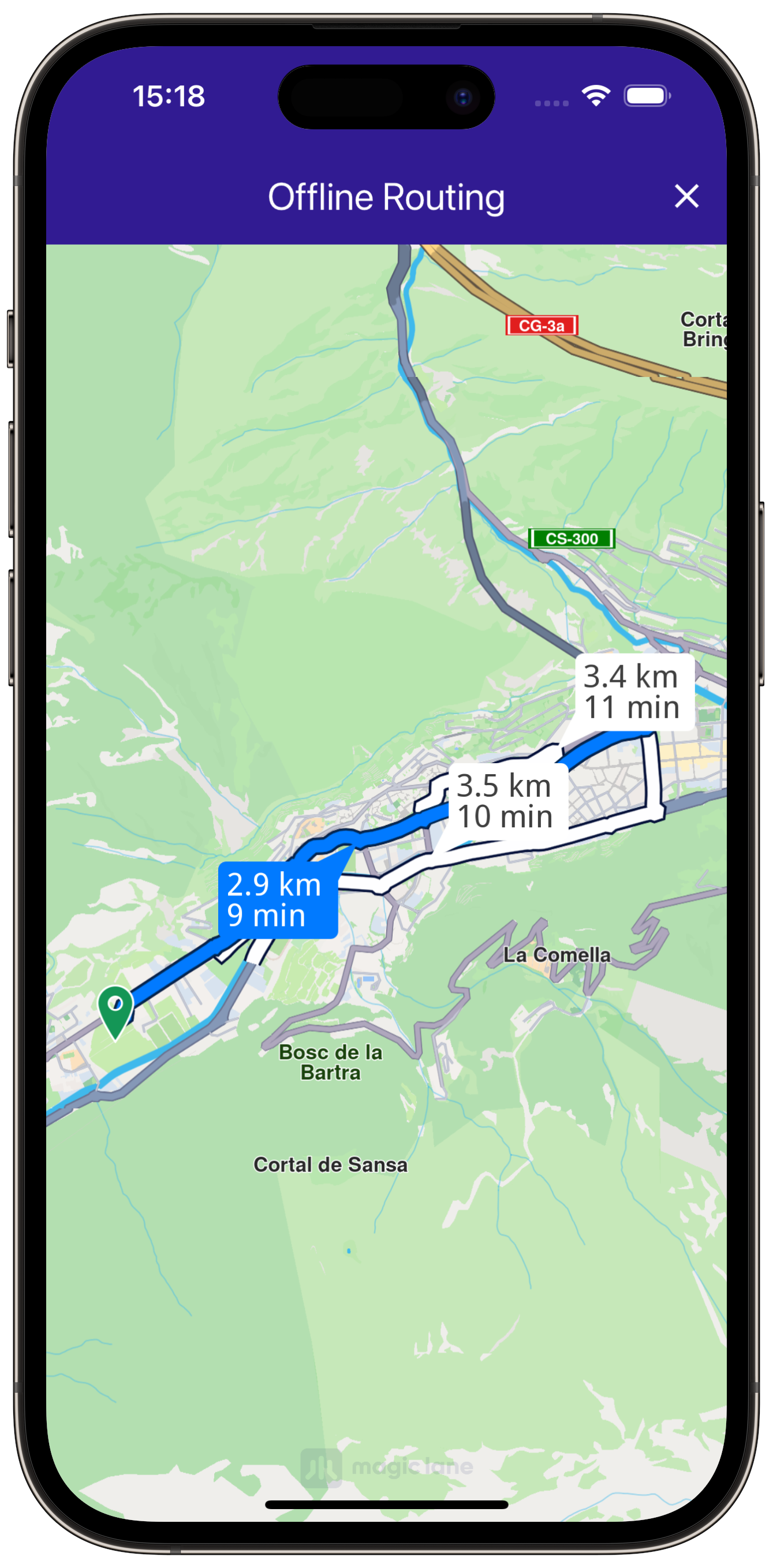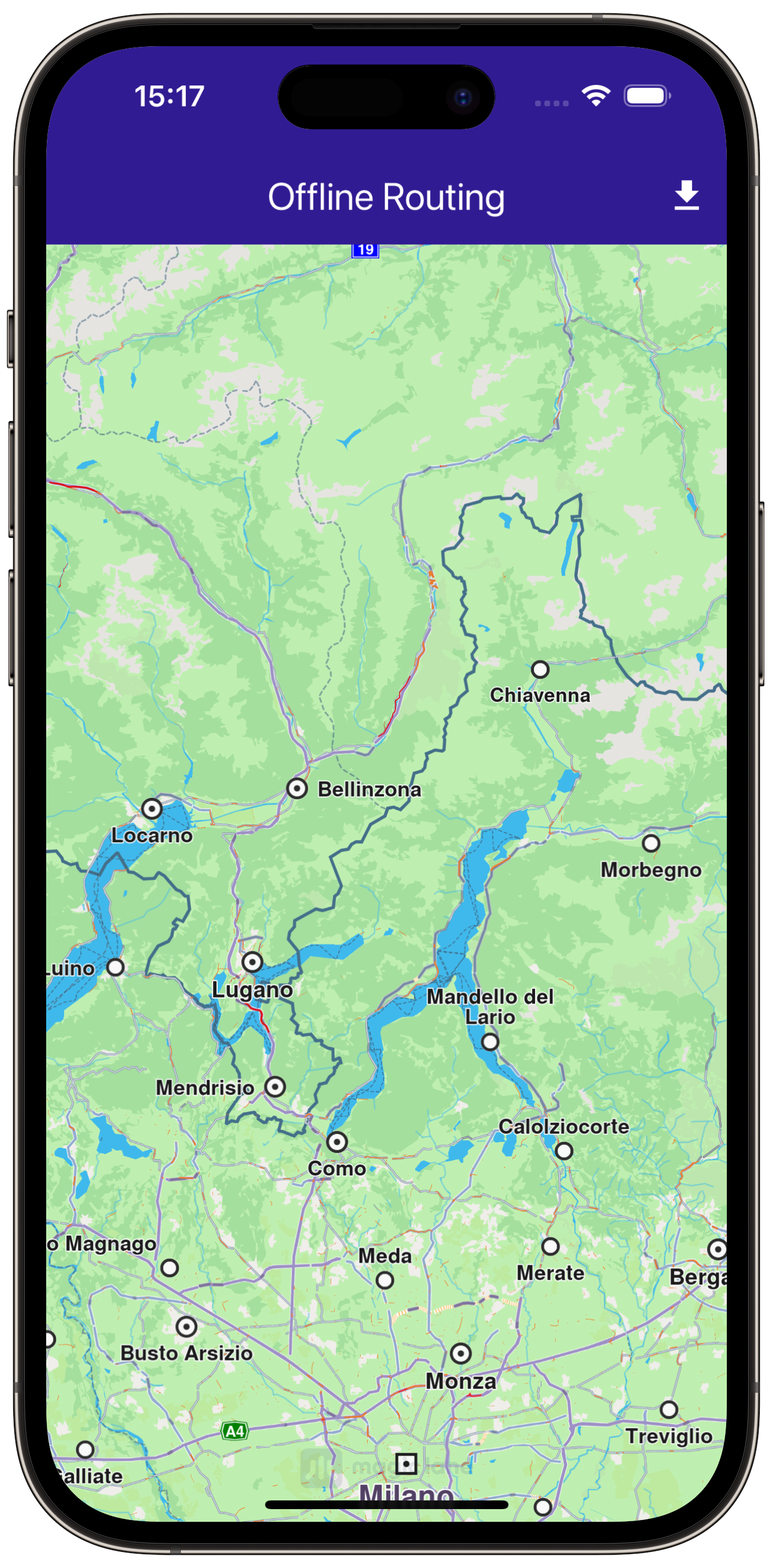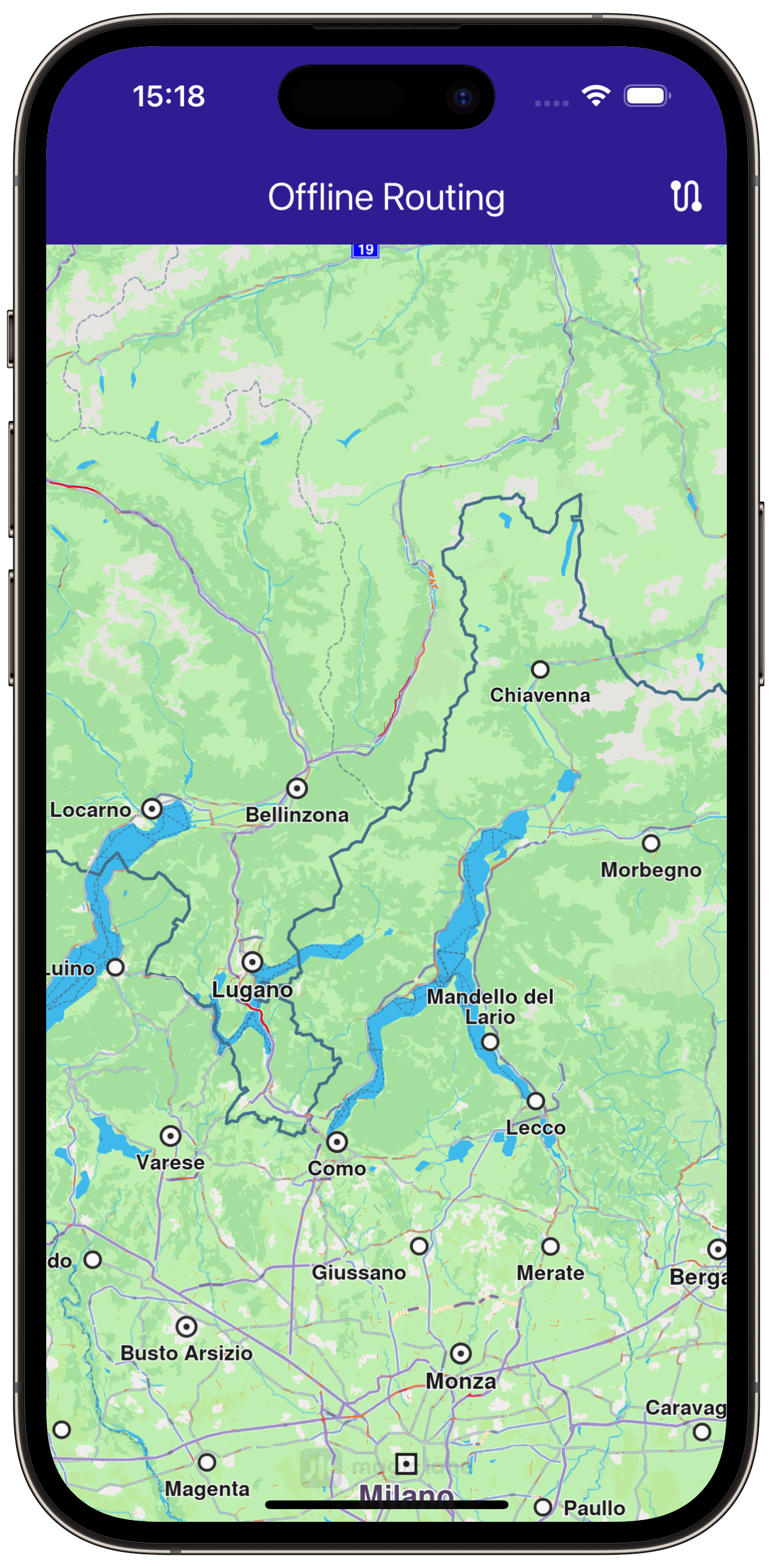Offline Routing¶
In this guide, you will learn how to implement offline routing functionality using the gem_kit package. This example demonstrates how to download a map for offline use, disable internet access, and calculate routes offline.
|
|||
Setup¶
Prerequisites¶
Build and Run¶
Start a terminal/command prompt and navigate to the offline_routing directory within the Flutter examples directory. This is the name of the example project.
Note - the gem_kit directory containing the Maps SDK for Flutter
should be in the plugins directory of the example, e.g.
example_pathname/plugins/gem_kit - see the environment setup guide above.
Run: flutter pub get
Configure the native parts:
First, verify that the ANDROID_SDK_ROOT environment variable
is set to the root path of your android SDK.
In android/build.gradle add the maven block as shown,
within the allprojects block, for both debug and release builds:
allprojects {
repositories {
google()
mavenCentral()
maven {
url "${rootDir}/../plugins/gem_kit/android/build"
}
}
}
in android/app/build.gradle
within the android block, in the defaultConfig block,
the android SDK version minSdk must be set as shown below.
Additionally, for release builds, in android/app/build.gradle,
within the android block, add the buildTypes block as shown:
Replace example_pathname with the actual project pathname
android {
defaultConfig {
applicationId "com.magiclane.gem_kit.examples.example_pathname"
minSdk 21
targetSdk flutter.targetSdk
versionCode flutterVersionCode.toInteger()
versionName flutterVersionName
}
buildTypes {
release {
minifyEnabled false
shrinkResources false
// TODO: Add your own signing config for the release build.
// Signing with the debug keys for now, so `flutter run --release` works.
signingConfig signingConfigs.debug
}
}
}
Then run the project:
flutter run --debugorflutter run --release
App entry and initialization¶
const projectApiToken = String.fromEnvironment('GEM_TOKEN');
void main() {
runApp(const MyApp());
}
This code initializes the projectApiToken with the required authorization token and launches the app.
How It Works¶
This example demonstrates the following features:
Download specific maps (e.g., for “Andorra”) to enable offline functionality.
Disable internet access after successful map download to enforce offline usage.
Compute routes offline between predefined waypoints, using the downloaded map data.
Build the Main Application¶
Define the main application widget, MyApp.
class MyApp extends StatelessWidget {
const MyApp({super.key});
@override
Widget build(BuildContext context) {
return const MaterialApp(
title: 'Offline Routing',
debugShowCheckedModeBanner: false,
home: MyHomePage());
}
}
Handle Maps and Routes in the Stateful Widget¶
Create the stateful widget, MyHomePage, which will handle the map and routing functionality.
class MyHomePage extends StatefulWidget {
const MyHomePage({super.key});
@override
State<MyHomePage> createState() => _MyHomePageState();
}
Define State Variables and Methods¶
Within _MyHomePageState, define the necessary state variables and methods to interact with the map and manage routes.
class _MyHomePageState extends State<MyHomePage> {
late GemMapController _mapController;
bool _areRoutesBuilt = false;
// We use the handler to cancel the route calculation.
TaskHandler? _routingHandler;
bool _isDownloaded = false;
double _downloadProgress = 0;
@override
void dispose() {
GemKit.release();
super.dispose();
}
@override
Widget build(BuildContext context) {
return Scaffold(
appBar: AppBar(
backgroundColor: Colors.deepPurple[900],
title: const Text(
'Offline Routing',
style: TextStyle(color: Colors.white),
),
actions: [
// Map is downloading.
if (_isDownloaded == false && _downloadProgress != 0)
Container(
width: 20,
height: 20,
margin: const EdgeInsets.only(right: 10.0),
child: const Center(
child: CircularProgressIndicator(color: Colors.white),
),
),
// Map is not downloaded.
if (_isDownloaded == false && _downloadProgress == 0)
IconButton(
onPressed: () => _setOfflineMap(),
icon: const Icon(
Icons.download,
color: Colors.white,
),
),
// Routes are not built.
if (_routingHandler == null &&
_areRoutesBuilt == false &&
_isDownloaded == true)
IconButton(
onPressed: () => _onBuildRouteButtonPressed(context),
icon: const Icon(
Icons.route,
color: Colors.white,
),
),
// Routes calculating is in progress.
if (_routingHandler != null)
IconButton(
onPressed: () => _onCancelRouteButtonPressed(),
icon: const Icon(
Icons.stop,
color: Colors.white,
),
),
// Routes calculating is finished.
if (_areRoutesBuilt == true)
IconButton(
onPressed: () => _onClearRoutesButtonPressed(),
icon: const Icon(
Icons.clear,
color: Colors.white,
),
),
],
),
body: GemMap(onMapCreated: _onMapCreated, appAuthorization: projectApiToken),
);
}
void _onMapCreated(GemMapController controller) async {
// Save controller for further usage.
_mapController = controller;
SdkSettings.setAllowOffboardServiceOnExtraChargedNetwork(
ServiceGroupType.contentService, true);
}
|
|||
Define Route Calculation Logic¶
Implement methods to build routes based on predefined waypoints and manage the download of maps.
void _onBuildRouteButtonPressed(BuildContext context) {
// Define the departure.
final departureLandmark =
Landmark.withLatLng(latitude: 42.49720, longitude: 1.50498);
// Define the destination.
final destinationLandmark =
Landmark.withLatLng(latitude: 42.51003, longitude: 1.53400);
// Define the route preferences.
final routePreferences = RoutePreferences();
_showSnackBar(context, message: "The route is being calculated.");
// Calling the calculateRoute SDK method.
_routingHandler = RoutingService.calculateRoute(
[departureLandmark, destinationLandmark], routePreferences,
(err, routes) {
_routingHandler = null;
ScaffoldMessenger.of(context).clearSnackBars();
if (err == GemError.success) {
final routesMap = _mapController.preferences.routes;
for (final route in routes!) {
routesMap.add(route, route == routes.first,
label: route.getMapLabel());
}
_mapController.centerOnRoutes(routes);
setState(() {
_areRoutesBuilt = true;
});
}
});
setState(() {});
}
void _onClearRoutesButtonPressed() {
_mapController.preferences.routes.clear();
setState(() {
_areRoutesBuilt = false;
});
}
void _onCancelRouteButtonPressed() {
if (_routingHandler != null) {
RoutingService.cancelRoute(_routingHandler!);
setState(() {
_routingHandler = null;
});
}
}
Define Map Downloading Logic¶
Implement methods for downloading and managing the offline map.
Future<List<ContentStoreItem>> _getMaps() async {
Completer<List<ContentStoreItem>> mapsList =
Completer<List<ContentStoreItem>>();
ContentStore.asyncGetStoreContentList(ContentType.roadMap,
(err, items, isCached) {
if (err == GemError.success && items != null) {
mapsList.complete(items);
}
});
return mapsList.future;
}
void _setOfflineMap() {
final localMaps = ContentStore.getLocalContentList(ContentType.roadMap);
if (localMaps.where((map) => map.name == 'Andorra').isNotEmpty) {
setState(() {
_isDownloaded = true;
});
SdkSettings.setAllowConnection(false);
return;
}
_getMaps().then((maps) {
_downloadProgress = maps[4].downloadProgress.toDouble();
_downloadMap(maps[4]);
});
}
void _downloadMap(ContentStoreItem map) {
map.asyncDownload(_onMapDownloadFinished,
onProgressCallback: _onMapDownloadProgressUpdated,
allowChargedNetworks: true);
}
void _onMapDownloadProgressUpdated(int progress) {
setState(() => _downloadProgress = progress.toDouble());
}
void _onMapDownloadFinished(GemError err) {
if (err == GemError.success) {
SdkSettings.setAllowConnection(false);
setState(() => _isDownloaded = true);
}
}
Show SnackBar for User Feedback¶
Implement a method to show a SnackBar for providing feedback to the user.
void _showSnackBar(BuildContext context,
{required String message, Duration duration = const Duration(hours: 1)}) {
final snackBar = SnackBar(
content: Text(message),
duration: duration,
);
ScaffoldMessenger.of(context).showSnackBar(snackBar);
}
|
|||
Define Extension for Route Label¶
Define an extension to format the route label displayed on the map.
extension RouteExtension on Route {
String getMapLabel() {
final totalDistance = getTimeDistance().unrestrictedDistanceM +
getTimeDistance().restrictedDistanceM;
final totalDuration =
getTimeDistance().unrestrictedTimeS + getTimeDistance().restrictedTimeS;
return '${_convertDistance(totalDistance)} \n${_convertDuration(totalDuration)}';
}
String _convertDistance(int meters) {
if (meters >= 1000) {
double kilometers = meters / 1000;
return '${kilometers.toStringAsFixed(1)} km';
}
return '$meters m';
}
String _convertDuration(int seconds) {
if (seconds >= 3600) {
int hours = seconds ~/ 3600;
int minutes = (seconds % 3600) ~/ 60;
return '${hours}h ${minutes}m';
} else if (seconds >= 60) {
int minutes = seconds ~/ 60;
return '${minutes}m';
}
return '${seconds}s';
}
}
|
|||




